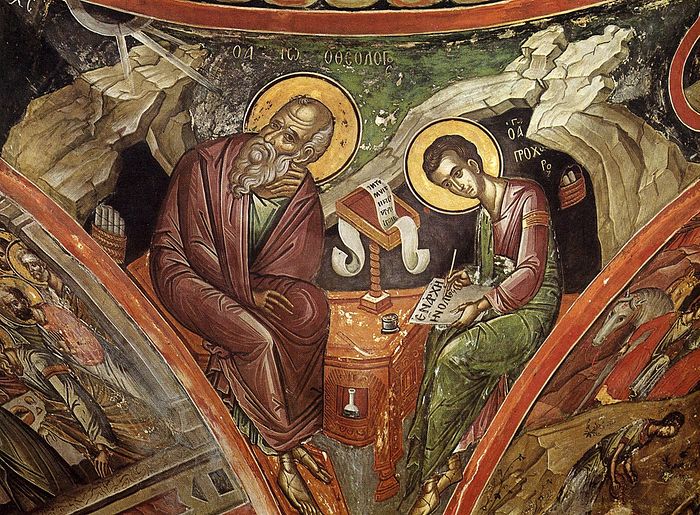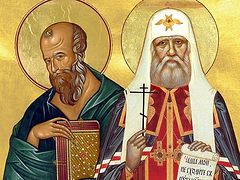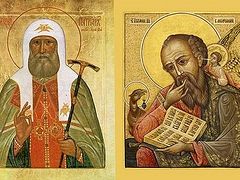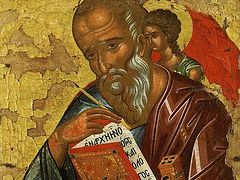The Holy Apostle and Evangelist John the Theologian has a special place in the ranks of the chosen Disciples of Christ the Savior. In iconography, the Apostle John is often depicted as a mild but majestic spiritual elder, with a look of chaste tenderness, complete peace of mind, and the profound gaze of one contemplating unspeakable revelations. Another principal characteristic of the Apostle’s spiritual mien is revealed in his teachings about love, teachings for which he came to be known as the Apostle of love. Truly, his writings are permeated with love, and the principal idea they express comes down to the understanding that, in His being, God is Love (I John 4:8). In them, he concentrates most on God’s manifestations of love for the world and for man, on the love shown by his Divine Teacher. He constantly exhorts his disciples to love one another.
The entire earthly journey of Holy Apostle John the Theologian was in service to Love.
His attributes included profound contemplation combined with ardent fidelity, a tender and boundless love, mixed with a fervor and even a degree of harshness. Brief indications in the Gospels evidence that he possessed an ardent nature, with episodes of heartfelt zeal sometimes so stormy that Jesus Christ would have to temper them, as things inconsistent with the spirit of his new teachings (Mark 9: 38–40; Luke 9: 49–50 and 9:54–56), and he called the Apostle John and his brother James Boanerges, i.e. “sons of thunder” (Mark 3:17). At the same time, John manifested a rare degree of humility, and despite his special place among the Apostles as the disciple whom Jesus loved, did not stand out from the ranks of the Savior’s other disciples. Distinctive features of his character were his keen powers of observation and perception of events, finely attuned to the will of God. The impressions the Holy Apostle acquired through observation were rarely reflected in words and actions, but they powerfully and deeply permeated his internal life. Always sensitive towards others, he was sick at heart over those who were perishing. The Apostle John heeded his Teacher’s divinely-inspired teachings with trepidation; filled with grace and truth, in pure and exalted love, contemplating the Glory of the Son of God. Not a single aspect of Christ the Savior’s earthly life escaped Apostle John’s perceptive gaze, and not a single event passed without leaving a profound impression on his memory. For this reason, in him were concentrated the fullness and integrity of the human personality. Saint John the Theologian’s ideas reflected that same integrity. For him, there was no such thing as being of two minds. He was convinced that where there was not total devotion, there was nothing. Having chosen the path of service to Christ, he displayed throughout his life an undivided commitment to following it fully. Apostle John spoke of total devotion to Christ, of the fullness of life in Him, for he saw sin not as weakness and damaged human nature, but as evil, the completely negative opposite of good. (John 8: 34; I John 3: 4, 8– 9). In his opinion, it is possible to belong either to Christ or to the devil; there could be no ambiguous middle ground. (I John 2: 22; I John 14: 3). Thus, he served the Lord with undivided love and self-denial, rejecting everything that belonged to man’s original and eternal enemy, the enemy of truth, the father of lies (I John 2: 21–22). The more man loves Christ, the more strongly he hates antichrist; the more he loves truth, the more he hates lies, and light drives away darkness (John 8: 12; John 12: 35–36). With that expression of internal fire of love, with particular strength of spirit, he bears witness regarding the Divinity of Jesus Christ (John 1: 1–18; I John 5: 1–12).
It was given to Apostle John to express the final word of Divine Revelation, leading into the most secret mysteries of Divine life, known only to the eternal Word of God, His Only-begotten Son.
Truth is reflected in his mind and in his words, for he feels it and comprehends it in his heart. He contemplates eternal Truth, and as he sees it, passes it on to his beloved children. The Apostle John plainly confirms or denies, and always speaks with absolute specificity. (I John 1: 1). He hears the voice of the Lord, which reveals to him what the Lord Himself hears from the Father.
Apostle John’s Theology destroys the barrier between the present and the future. Observing the present, the temporal, he does not stop there, but turns his gaze on the eternal in the past and the eternal in the future. For that reason, in calling us to holy life, triumphantly exclaims that “whosoever is born of God sinneth.” (I John 5: 18; I John 3: 9). In communion with God, the true Christian communes of Divine life, and therefore humanity’s future is already taking place here on earth. In his presentation and revelation of the doctrine of the building of salvation, Holy Apostle John the Theologian moves to the realm of the eternal present, in which Heaven descended to earth, and a renewed earth is illumined with the Light of Heavenly Glory
Thus did a fisherman from Galilee, a son of Zebedee, become a Theologian and through his Revelation heralded the mystery of the earth’s genesis and the fate of mankind.
Parish Life, St. John the Baptist Church, Washington DC
October 2018




